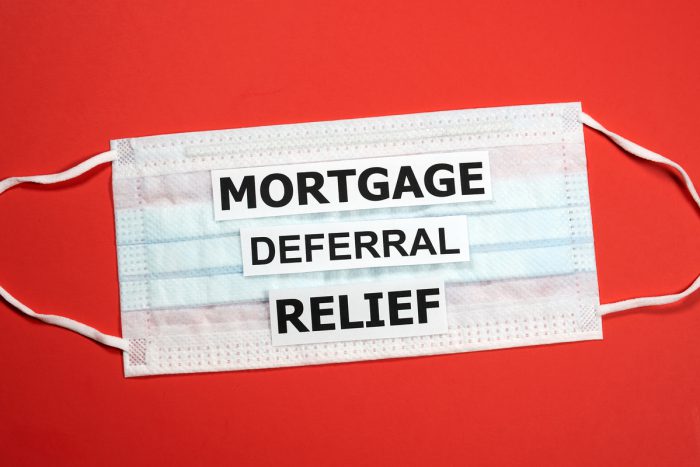Six hundred thousand Canadians weren’t paying their mortgages on July 31. They were getting by with the help of lenders who agreed to postpone their payments.
Not long from now, lenders are going to cut off most of those payment deferrals.
The housing risk this poses was the topic of my latest Globe column, which estimated that up to 61,000 forced sales could hit the market as people coming off mortgage deferrals aren’t able to make their payments. That’s based largely on National Bank Financial (NBF) analyst Gabriel Dechaine’s estimated 0.90% to 0.95% mortgage arrears rate in 2021.
Following that story, we obtained fresh data from Equifax. It shines new light on how vulnerable mortgage deferrers really are.
The Numbers
- The total number of Canadians with mortgage payment deferrals
- About 1.2 million Canadians have deferred at least one mortgage payment between March and July
- This is much higher than the Canadian Bankers Association numbers you see in the papers — because it includes mortgages from non-banks as well.
- Approximately 600,000 consumers were still deferring mortgage payments on July 31.
- New deferral requests are being accepted at most big banks until the end of this month.
- About 1.2 million Canadians have deferred at least one mortgage payment between March and July
- These are the average mortgage balances for mortgagors who:
- Deferred one or more mortgage payments: $270,000
- Did not defer any mortgage payments: $216,000
- These are the average credit scores for mortgagors who:
- Deferred one or more mortgage payments: 727
- Did not defer any mortgage payments: 773
Three notes: (1) These scores were as of February 2020. (2) The scores cited here are Equifax Credit Risk scores. (3) Much of the mortgage industry utilizes FICO scores as opposed to Equifax Credit Risk scores, but the trend is similar, says Equifax. Deferral consumers have unmistakably lower scores on average.
- Here’s the percentage of non-mortgage credit utilized by mortgagors who:
- Deferred one or more mortgage payments: 53%
- Did not defer any mortgage payments: 37%
What this shows is how much people have borrowed, relative to their total available non-mortgage credit limits. No surprise that deferring borrowers are more leveraged.
- Percentage of mortgagors with revolving credit lines (secured against their home or unsecured):
- Those with a mortgage deferral: 69%
- Those with no mortgage deferral: 71%
Quite similar. Clearly, many deferrers could have made their payments by borrowing from their credit lines. This and other factors suggest that the majority of those coming off deferrals will not default.
- Percentage of mortgage deferrers who were delinquent on other non-mortgage debts:
- One in 6 already had some form of delinquency (30+ days late on at least one account) on their credit file, as of February 29, 2020
******
In Sum
According to Equifax and on average, Canadians who’ve deferred mortgage payments have:
- 25% bigger mortgages
- 46-point worse credit scores
- 16-percentage point higher credit usage.
In short, a very large number of deferrers need deferrals.
If mass payment forbearance ends as expected next quarter and we do get 60,000+ forced liquidations, say goodbye to record-high home prices for a while. But it doesn’t follow that we should expect waterfall price declines.
The U.S. saw 2,824,674 foreclosed properties during its housing crisis in 2009, almost 1% of its population. If our NBF-derived estimate hypothetically proved true (and it may be aggressive), the estimate for Canada from mid-2021 to mid-2022 is just 0.16%.
Big difference.

 log in
log in

5 Comments
Unemployment is still over 10%. I would bet at least 10% of people with mortgages will have less income at the end of this year than they did before covid. That is 600,000 households.
Do you have more details than what you posted? The type of credit used is important to know. Someone with a large SLoC who is using 50% of it and 3% of their credit card limits is in a better financial position than someone utilizing 30% of their available credit card limits.
Knowing the LTV on the deferred vs non-deferred mortgages would also be helpful.
And as I’ve pointed out before, deferrals can be a smart way of reducing debt service costs. For example if you have a mortgage at 2%, and a 5% car loan, then defer your mortgage payments for 6 months to pay off your car loan.
Hey Ralph,
You’re absolutely right that at least a decent minority of deferrals were strategic and not for default avoidance.
Overall the numbers don’t lie, however. The lower credit scores are almost certainly reflective in part of deferrers’ higher credit utilization.
Equifax doesn’t track property values but I haven’t seen anything to suggest that deferrers have more favourable loan-to-values.
Detached houses being “dumped” power of sale in this market would be doing so into a very strong sellers market.
In fact the detached market in the GTA could use some more inventory pronto to dampen the runaway prices of the last two months.
Indeed